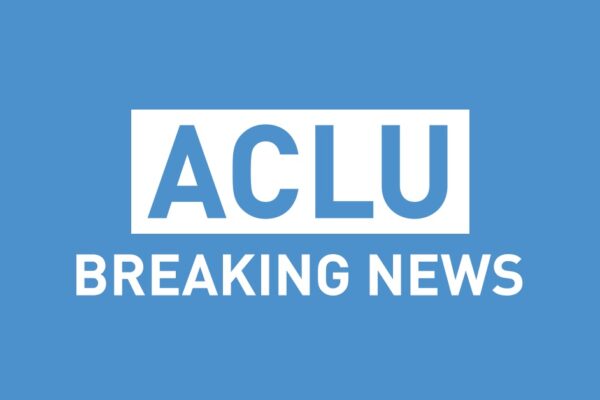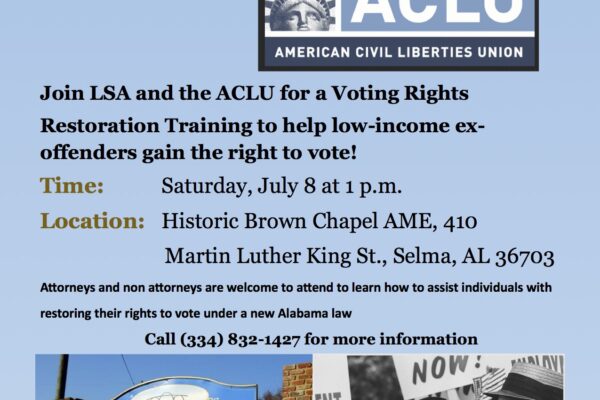SELMA, Ala. - The fight for voting rights has a storied and painful past here in Alabama. In 1965, when African Americans were effectively denied their constitutional right to vote through violence, threats, poll taxes and literacy tests, activists organized what would become known as the Selma-to-Montgomery marches. The national outcry over law enforcement’s use of brutal force to stop the first march, also known as "Bloody Sunday," set the stage for the Voting Rights Act that was passed later that year.
Brown Chapel A.M.E. Church in Selma has been a linchpin in the Civil Rights Movement, as the starting point for the Selma-to-Montgomery marches and a haven for organizers including the Southern Christian Leadership Conference and its leader, Dr. Martin Luther King. Now, Legal Services Alabama and the ACLU of Alabama will return to the scene to once again do the work of restoring the right to vote for a new class of citizens: low income people with non-violent felony convictions who have paid their debt to society and seek re-entry to their communities.
A new Alabama law signed in May will allow thousands of people to restore their right to vote, and on July 8, LSA and ACLU of Alabama will host a training session at Brown Chapel A.M.E. Church to train volunteer lawyers and non-lawyers about this new law, and how Alabamians can comply with its terms to win back their rights to vote.
Historically, Alabama's Constitution stated that individuals convicted of "crimes of moral turpitude" could no longer vote. However, what constitutes a crime of moral turpitude was left to the county registrars to decide, which led to a wide range of interpretations that left thousands of disenfranchised Alabamians, many of them poor and disadvantaged.
This new law brings hope for those who have been unfairly stripped of their right to vote because it finally provides a clear definition of what is and is not a crime of moral turpitude. But the law will require that wrongfully disenfranchised Alabamians formally comply with a process for application with the Board of Pardons and Parole. This partnership of two of Alabama’s major public interest law groups has been formed to provide assistance to individuals wishing to follow the law to reclaim their rights.
"The ACLU of Alabama is proud to work with Legal Services Alabama in a campaign to restore voting rights," Randall Marshall, Acting Executive Director of the ACLU of Alabama said. "Felon disenfranchisement laws are vestiges of the Jim Crow era. The fundamental right to vote extends to every American citizen."
As the Executive Director of Legal Services of Alabama, Artur Davis, states, “If we take reentry for ex-offenders seriously, we have to recognize that re-entry means resumption of the rights and privileges of American citizenship. Helping these men and women comply with their legal obligations fills a new, unmet need for many of the low income Alabamians who are our client base."
While those who commit murder, rape, sexual abuse, and other heinous acts will still be barred from ever regaining their right to vote without a pardon, there are many more convictions that will no longer strip individuals of their right to vote. Those convictions include common driving offenses, receiving stolen property, drug possession for personal use, and other state drug crimes. Individuals with these convictions can even vote while incarcerated.
LSA and the ACLU of Alabama will also host "restoration clinics" at churches in Birmingham, Mobile, and Selma this summer, and will conduct caravans to high visibility areas in low income neighborhoods in those cities as well. The effort will resume in the fall, with a full statewide outreach effort.
"Effective legal aid for the poor requires taking your work to the neighborhoods where disadvantaged people live. That is why we are drawing on the clergy community and why we will literally be going on the road in Birmingham, Mobile and the Black Belt in late summer," said Executive Director Davis.
These clinics and caravans will give people the resources and the legal assistance they need to check their voter registration status and eligibility for restoration, to fill out their applications, and to increase their chances at successfully restoring their right to vote.
As the legendary Civil Rights activist and Selma marcher Amelia Boynton once said, "A voiceless people is a hopeless people." This effort to bring the voting rights restoration process to low income, often marginalized Alabamians is a vital contribution to LSA’s efforts on behalf of low wage and low income people and ACLU’s mission of securing civil liberties for the voiceless.
The Voter Rights Restoration Training will be held on July 8, 2017 at 1pm at the Brown Chapel A.M.E. Church in Selma. The dates of the restoration clinics will begin in mid to late July, and will be announced in coming weeks. If you have additional questions, contact Rebecca Seung-Bickley at 334-420-1743 or Desiree Taylor at 334-832-1427.
###
Stay Informed
Sign up to be the first to hear about how to take action.
By completing this form, I agree to receive occasional emails per the terms of the ACLU’s privacy statement.
By completing this form, I agree to receive occasional emails per the terms of the ACLU’s privacy statement.




